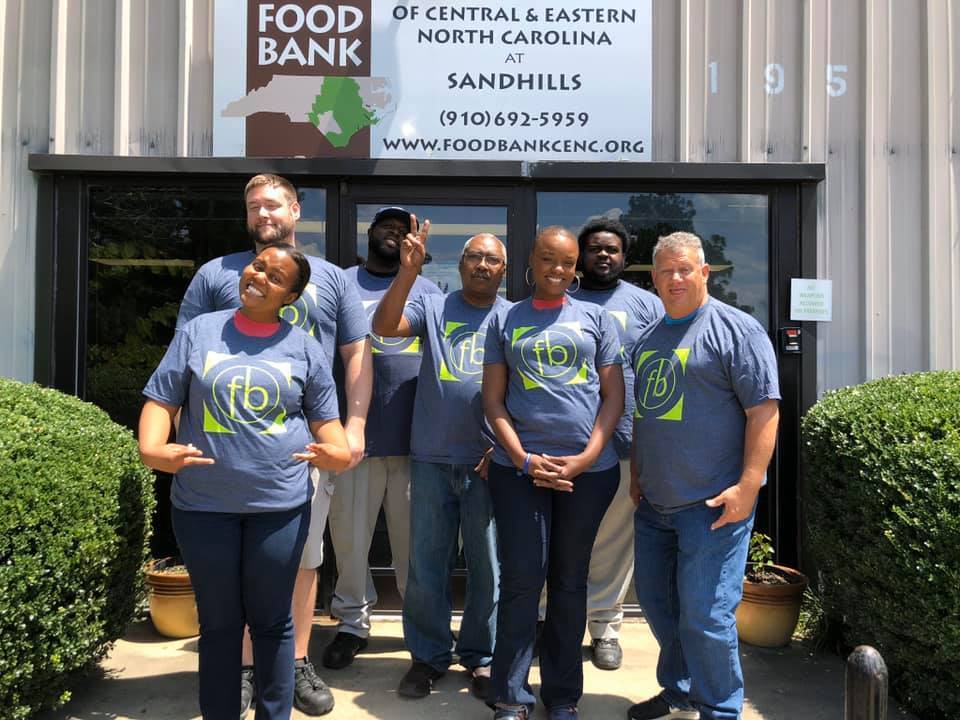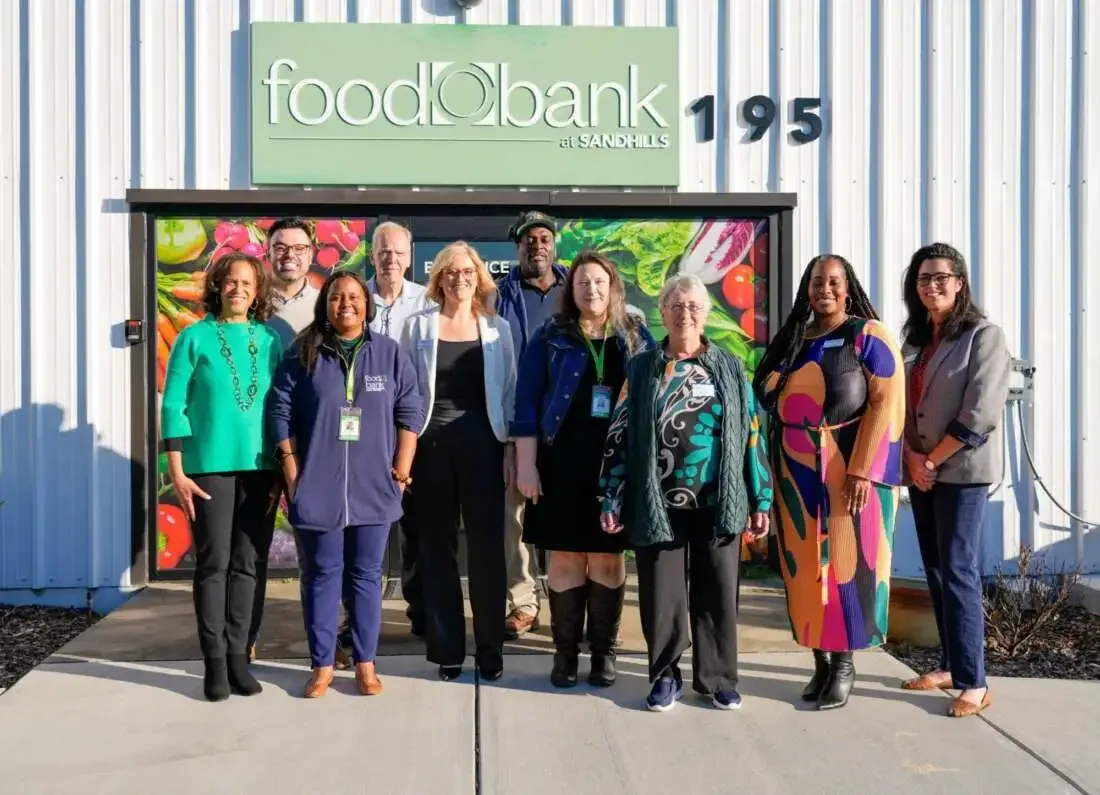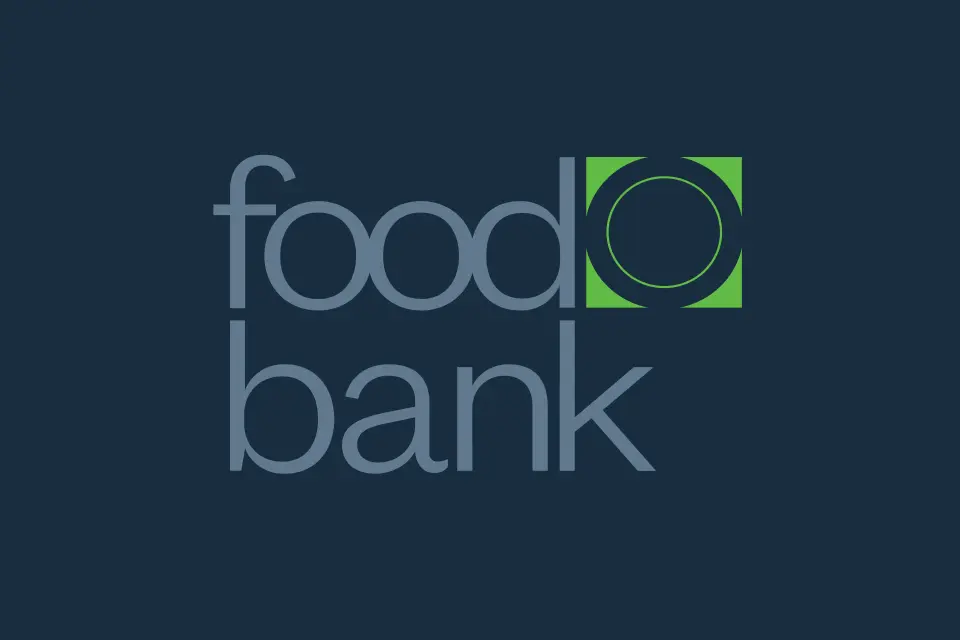Our Statement on USDA Elimination of Vital Hunger Data
Our new-and-improved Food Bank at Sandhills offers increased food storage capacity, expanded community space, and an inviting design to welcome neigbhors.
For over 40 years, the Food Bank at Sandhills has served families facing hunger across Lee, Moore, Richmond, and Scotland counties. Just last year, the Sandhills Branch provided over 7 million meals through the Food Bank’s network of 89 local pantries, meal sites, no-cost markets, and delivery programs.
At the November ribbon-cutting event, Food Bank staff were joined by local partner agencies and volunteers who show up every day to support families across the Sandhills. And we were excited to unveil a new facility that nearly doubles our capacity to provide fresh fruits, vegetables, dairy, and protein in the region — offering even greater options for food assistance and community support.
– Jason Kanawati Stephany Food Bank Vice PresidentPoliticians in Washington voted to slash the federal safety nets that help millions of people in North Carolina afford food and medicine. They know their decisions will worsen our hunger crisis, and now they're attempting to hide the evidence by eliminating impact data that has been available to the public for decades.
Administrative changes at the USDA can't erase the reality our communities face every day: the price of groceries remains out of reach for far too many families — and more people are seeking food assistance today than any point in the past 20 years.
Our hunger relief network relies on this data to target resources where they're needed most, especially in rural communities where services are more difficult to access. The General Assembly and state agencies need reliable data to make smart investments in the most effective programs. This information takes even greater importance when tight budgets require tough decisions — and there are no shortage of difficult fiscal discussions underway right now.
We need our Members of Congress to understand the impact this irresponsible decision will have on kids, seniors, and people with disabilities across North Carolina. It's incredibly important that we all make our voices heard and urge elected leaders to restore vital hunger data.


The ribbon-cutting event was an opportunity to acknowledge rising challenges in the Sandhills — and celebrate how far we've come in our shared effort to end hunger.
As the first Branch Director in 2011, Michael Cotten supported the Food Bank at Sandhill’s inaugural volunteer program, Backpack Pals. Started by Linda Hubbard in partnership with Moore County Public Schools, Backpack Pals provides backpacks filled with shelf-stable meals for children over the weekend. During Cotten’s tenure as Branch Director, volunteers filled over 1,000 backpacks a week in just over an hour of effort.
It didn't take long for community supporters to take note of this new resources, and dedicated funding was soon in hand to help nourish kids in the Sandhills throughout the school year.
– Jason Kanawati Stephany Food Bank Vice PresidentPoliticians in Washington voted to slash the federal safety nets that help millions of people in North Carolina afford food and medicine. They know their decisions will worsen our hunger crisis, and now they're attempting to hide the evidence by eliminating impact data that has been available to the public for decades.
Administrative changes at the USDA can't erase the reality our communities face every day: the price of groceries remains out of reach for far too many families — and more people are seeking food assistance today than any point in the past 20 years.
Our hunger relief network relies on this data to target resources where they're needed most, especially in rural communities where services are more difficult to access. The General Assembly and state agencies need reliable data to make smart investments in the most effective programs. This information takes even greater importance when tight budgets require tough decisions — and there are no shortage of difficult fiscal discussions underway right now.
We need our Members of Congress to understand the impact this irresponsible decision will have on kids, seniors, and people with disabilities across North Carolina. It's incredibly important that we all make our voices heard and urge elected leaders to restore vital hunger data.
Today, more than 38,000 people face food insecurity in the region as the cost of living continues to rise.
This means one out of every six neighbors across Lee, Moore, Richmond, and Scotland counties struggle to keep food on the table. The rising costs of food, medicine, and housing have drive more people to seek food assistance from the Food Bank network than any time in recent memory. And now, neighbors are greeted with a bright and welcoming space to comfortably receive food and get connected to local resources.
– Jason Kanawati Stephany Food Bank Vice PresidentPoliticians in Washington voted to slash the federal safety nets that help millions of people in North Carolina afford food and medicine. They know their decisions will worsen our hunger crisis, and now they're attempting to hide the evidence by eliminating impact data that has been available to the public for decades.
Administrative changes at the USDA can't erase the reality our communities face every day: the price of groceries remains out of reach for far too many families — and more people are seeking food assistance today than any point in the past 20 years.
Our hunger relief network relies on this data to target resources where they're needed most, especially in rural communities where services are more difficult to access. The General Assembly and state agencies need reliable data to make smart investments in the most effective programs. This information takes even greater importance when tight budgets require tough decisions — and there are no shortage of difficult fiscal discussions underway right now.
We need our Members of Congress to understand the impact this irresponsible decision will have on kids, seniors, and people with disabilities across North Carolina. It's incredibly important that we all make our voices heard and urge elected leaders to restore vital hunger data.
We are sincerely grateful for our partner agencies who are moving mountains to nourish families during the government shutdown and beyond.
The combined effort is incredibly important, as military families in the area are navigating unprecedented uncertainty. And with the new facilities, local partner agencies have the space and capacity to explore new ways improve food access in the Sandhills.
– Jason Kanawati Stephany Food Bank Vice PresidentPoliticians in Washington voted to slash the federal safety nets that help millions of people in North Carolina afford food and medicine. They know their decisions will worsen our hunger crisis, and now they're attempting to hide the evidence by eliminating impact data that has been available to the public for decades.
Administrative changes at the USDA can't erase the reality our communities face every day: the price of groceries remains out of reach for far too many families — and more people are seeking food assistance today than any point in the past 20 years.
Our hunger relief network relies on this data to target resources where they're needed most, especially in rural communities where services are more difficult to access. The General Assembly and state agencies need reliable data to make smart investments in the most effective programs. This information takes even greater importance when tight budgets require tough decisions — and there are no shortage of difficult fiscal discussions underway right now.
We need our Members of Congress to understand the impact this irresponsible decision will have on kids, seniors, and people with disabilities across North Carolina. It's incredibly important that we all make our voices heard and urge elected leaders to restore vital hunger data.
Take Action to Help End Hunger in the Sandhills
Together, we are building a stronger hunger relief network in the Sandhills — and we thank all of the incredible community supporters who make this work possible!
Get involved with local pantries and meal sites.
Noticias y actualizaciones
Ver todas las noticias
Honoring Governor Jim Hunt’s Legacy

Black History and the Fight to End Hunger

Black History and the Fight to End Hunger

Food Resources & Support for Families in Richmond County
Manténgase conectado con el Banco de Alimentos
Regístrese para recibir correos electrónicos con actualizaciones, recursos y formas de participar.